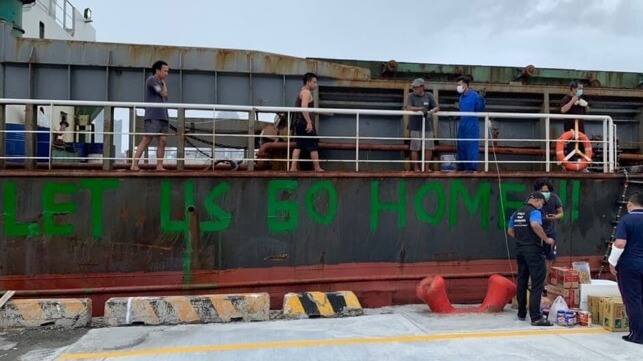Calls for Intervention as Seafarer Abandonment Reaches Record Levels

One of the perennial issues in the industry is the plight of seafarers abandoned by shipowners and operators often without food and resources in violation of international treaties and the Maritime Labour Convention. In a new exposé, the Associated Press is shining a light on the issue while charities such as Stella Maris are calling for new efforts to steam the alarming rise in abandonment cases.
Stella Maris, which calls itself the world’s largest ship-visiting charity operating at 353 ports, highlights the alarming rise in abandonment cases. They are citing data from the International Maritime Organization (IMO) that shows more than 100 reported cases so far in 2024. Last year, the IMO and the International Labor Organization, which are jointly charged to track cases, highlighted 143 cases in 2023 up from “little more than a dozen-a-year” a decade ago.
However, that may just be the tip of the iceberg according to AP. They analyzed the databases from the IMO and ILO and found “more than 2,000 seafarers were stranded last year across some 150 ships – the worst year on record.” The analysis shows cases are at their highest level in the 20 years since the UN organizations began tracking abandonment cases.
A variety of issues are contributing to the dramatic rise in the number of cases. Costs and especially fuel have skyrocketed for many shipowners. Further, the abandonment typically happens when small owners fall into financial troubles due to unexpected expenses or costly repairs to their vessels. Often the ships in these cases are older and poorly maintained.
Stella Maris in its statement highlights the situation has reached “alarming levels.” They cite it as a humanitarian crisis noting that many seafarers end up facing mental issues as well as welfare as they struggle to find a way home.
“This is a call to action for the entire maritime industry,” said Stella Maris CEO Tim Hill. “We must unite to enforce international laws, hold negligent companies accountable, and provide immediate assistance to abandoned crew.”
Under international agreements, flag states are required to provide assistance when an owner can no longer be found or is unable to meet its obligations. Seafarers are reluctant to leave a vessel in fear that they will never get their back pay. Organizations such as the International Transport Workers’ Federation and Port State authorities also get involved in trying to get back pay and to get the operators to meet their contractual obligation to provide transportation home. Seeking a legal route in the courts takes a long time until a vessel can be seized and auctioned to pay the bills.
“We ask those companies and organizations which benefit from the maritime industry, such as major retailers, to join us to put a stop to abandonment,” said Deacon Joseph O’Donnell, Stella Maris Senior Area Port Chaplain for Scotland and Northern Ireland.
Among the steps Stella Maris is calling for are efforts to stop the recruiting of unsuspecting seafarers by unlicensed agents operating in emerging countries such as India and the Philippines. Stella Maris wants better regulation and oversight of recruiters and calls for the introduction of skilled work visas in the industry.
Some countries such as the Philippines were forced to take action against the recruiting practices. Last year, the European Union threatened to ban Filippino seafarers after what it said was a persistent issue of poor training and the recruiting practices of some agencies. AP in its analysis says the largest number of cases of abandonment came from ships registered in Panama, which corresponds to Panama registering the largest number of ships. However, AP calls out others including Tanzania, Palau, and Togo, which it says were each responsible for about five percent of the cases.
The International Transport Workers' Federation last week added two new countries, Gabon and Eswatini, to its list of Flags of Convenience nations while removing Tonga from the list. The trade union parent group highlights the two new additions are closely linked to the growth of the shadow fleet of tankers and bring to 43 the total number of nations on its list. Due to what it sees as lax regulations, enforcement, and adherence to the rules, the ITF targets vessels from these nations for more frequent inspections while trying to organize support efforts for seafarers.

that matters most
Get the latest maritime news delivered to your inbox daily.
“Awareness of these issues needs to be raised to higher government levels. It is a truly global issue,” concludes Deacon O’Donnell. The Catholic charity highlights that its teams provide pastoral support as well as supplying practical items including groceries, clothing, and SIM cards for mobile phones, while emphasizing that these seafarers are being left not only without wages and support, they lack a way to get home.
Stella Maris is calling on organizations to unite in support of abandoned seafarers. They are saying more needs to be done for the enforcement of international laws to hold negligent companies accountable and provide immediate assistance to abandoned crews.
